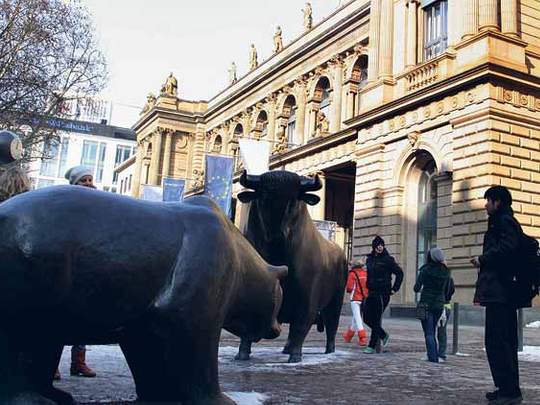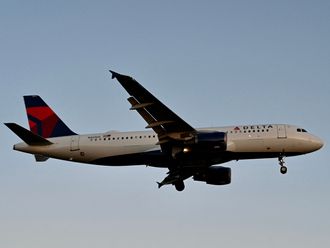
Frankfurt: Deutsche Boerse, which in November started a new venture for pan-European stock and derivatives trading, said it's "optimistic" it can gain as much as 5 per cent of market share.
"We've had up to 30 million euros [Dh149.8 million] turnover on a single day, but again it is early days," Rainer Riess, managing director of Xetra Market Development, said in an interview in Frankfurt.
"The next frontier for us is 3 per cent to 5 per cent and we are optimistic to reach it. In general, and valid for any new venue, 3 to 5 per cent market share is the hurdle to be on the map." Riess didn't specify to which market he referred or a time period.
The Xetra International Market, which uses the German exchange's existing electronic system, went live on November 2. The exchange offered the 260 existing customers of Xetra, its electronic trading system, the opportunity to buy and sell European stocks outside Germany and the corresponding equity and index derivatives.
Rivals
Deutsche Boerse, Eur-ope's largest exchange by market value, London Stock Exchange Group Plc and NYSE Euronext have lost market share to pan-European rivals including Chi-X Europe Ltd and Bats Europe, both of which are backed by banks and brokers. The so-called multi-lateral trading facilities have taken business away, in part by offering cheaper trading of stocks listed on primary markets.
"In 2010 we are unlikely to see many new entrants," Riess said. The industry faces "price cuts, consolidation, cost cutting. I'm glad we started when we did, it's going to be tough for any others who come now".
With its new system, Deutsche Boerse took a different route to its peers. Nasdaq OMX Group Inc has a separate, London-based MTF, as does NYSE Euronext with NYSE Arca Europe, which trades 400 to 500 stocks that aren't listed on NYSE Euronext's four European bourses. LSE bought rival Turquoise and merged it with its Baikal division.
As volumes on the new trading systems have grown, with Chi-X Europe this month saying it's generating profit and aims to become "the number one exchange in Europe", pressure on traditional exchanges' prices has increased.
"We look at our market share and the volumes continuously and constantly review our pricing strategy," Riess said, asked if he's prepared to drop prices.
Slow recovery
Initial public offerings have been slower to recover in Europe than in the US and Asia from the worst financial crisis since the Great Depression. Even so, Riess said there are "a lot" of companies ready to hold IPOs in Germany.
"During a normal year you would expect to maybe see about 50 IPOs and we probably know of even more companies than that who have done all their preparation," Riess said. "The question is when will price expectations of investors and issuers converge. Investors still expect large discounts, at which many companies are not willing to sell their shares."
Bankers at Citigroup Inc, Bank of America Corp and Deutsche Bank AG had projected at the start of the year that decade-high returns in European stocks last year would propel IPOs to at least three times the $8.9 billion (Dh32.6 billion) sold in 2009. The nine US companies that completed deals this year cut their offerings by an average of 28 per cent from the maximum sought, data compiled by Bloomberg show.
- 28% cut in IPOs on average from maximum sought
- 260 existing customers of Xetra offered new facility












